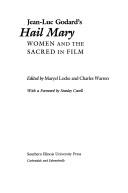| Listing 1 - 1 of 1 |
Sort by
|

ISBN: 0585107394 9780585107394 0809318245 0809318911 9780809318247 9780809318919 Year: 1993 Publisher: Carbondale : Southern Illinois University Press,
Abstract | Keywords | Export | Availability | Bookmark
 Loading...
Loading...Choose an application
- Reference Manager
- EndNote
- RefWorks (Direct export to RefWorks)
Maryel Locke and Charles Warren present twelve original essays by film critics, filmmakers, theologians, and philosophers that examine the 1985 film Hail Mary, directed by Jean-Luc Godard, and its companion film, The Book of Mary, directed by Anne-Marie Mieville. (The films are released under the one title Hail Mary) The interpretative essays offer a rich spectrum of analysis and opinion representing many divergent points of view about critical theory, the status of women, and the value of film as a medium. Locke and Warren also include two important interviews with Godard, brief biographies and complete filmographies of Godard and Mieville, a shot breakdown of the two films with the English subtitles, and the script of the French dialogue to complete a remarkably comprehensive treatment of these important films. The only film based on the biblical story of the Virgin Mary, Godard's Hail Mary is a contemporary Swiss/French representation of Mary's virgin pregnancy, the birth of her son, and her relationship to Joseph and her young child. Mieville's companion film is about a young girl named Mary whose parents get a divorce. While neither film is overtly religious, the initial release of Hail Mary brought public protests, court cases, a physical attack on Godard, and condemnation by the Pope. An insight emerging compellingly from the volume as a whole is that the camera, which possesses the capacity to invoke the mystery of human sexuality, itself partakes of, incarnates, the mystery of sexual difference. That is a fundamental fact about the medium of film, but a fact that current film theory, with its incessant identifications of the camera as masculine, denies. This is the central claim that, in the context of contemporary film study, gives the book a sharp critical edge and that seems likely to provoke considerable comment within the field.
Film --- Music, Dance, Drama & Film --- Mary, --- ʻAdhrāʼ --- Arogyamata --- Ārōkkiyamāta --- Birhen ng mga Dukha --- Blessed Lady --- Blessed Mother --- Blessed Virgin Mary, --- Hagnē Theotokos --- Madonna, The --- Mama Mary --- Mare de Déu --- Maria, --- Mariam Astuatsatsin --- Marie, --- Marie Théotokos --- Marii︠a︡, --- Maryam, --- Maryja, --- Meryem Ana --- Miryam, --- Mother of God --- Muíre, --- Nossa Senhora --- Our Lady --- Our Lady of Good Health --- Our Lady of Sorrows --- Our Lady of the Blessed Sacrament --- Qiddīsah Maryam --- Theotokos --- Vierge Marie, --- Virgen María --- Virgin Mary, --- Virgin of the Poor --- Ynang Maria --- مريم --- مريم العذراء --- 성모마리아 --- Our Lady of Emmitsburg --- Majka Isusova --- In motion pictures. --- Je vous salue, Marie (Motion picture) --- Livre de Marie (Motion picture) --- Book of Mary (Motion picture) --- Hail Mary (Motion picture) --- Mariam Astuatsatsin, --- Meryem Ana, --- Virgen María, --- Ynang Maria,
| Listing 1 - 1 of 1 |
Sort by
|

 Search
Search Feedback
Feedback About
About Help
Help News
News